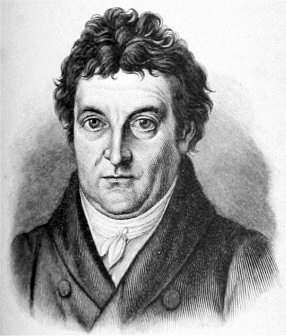Johann Gottlieb Fichte frasi celebri
Nicolao Merker
La missione del dotto, Citazioni sull'opera
La missione del dotto, lezione I, 1794
Origine: La missione del dotto, p. 12
Origine: La missione del dotto, p. 18
Frasi sull'et di Johann Gottlieb Fichte
Origine: La missione del dotto, p. 50
dalle Lezioni sulla missione del dotto, 1794
“Chiamo società la relazione reciproca degli esseri razionali.”
Origine: La missione del dotto, p. 22
“L'intellettuale è tale solo se considerato all'interno della società.”
Origine: La missione del dotto, p. 37
Nicolao Merker
La missione del dotto, Citazioni sull'opera
Johann Gottlieb Fichte Frasi e Citazioni
da Fondamento dell'intera dottrina della scienza, 1794 – GA, I/2 p. 394
“L'essenza interna ed assoluta di Dio viene alla luce come bellezza.”
Introduzione alla vita beata
Introduzione alla vita beata
Origine: La missione del dotto, p. 7
Origine: La missione del dotto, p. 12
Origine: La missione del dotto, p. 13
Origine: La missione del dotto, p. 13
Origine: La missione del dotto, p. 16
Origine: La missione del dotto, p. 17
Origine: La missione del dotto, p. 17
Origine: La missione del dotto, p. 26
“Noi siamo ancora al basso grado della semi-umanità, ovvero alla schiavitù.”
Origine: La missione del dotto, p. 32
Origine: La missione del dotto, p. 33-34
Origine: La missione del dotto, p. 39
“Nell'uomo esiste uno stimolo al sapere, e in particolare a ciò che gli torna utile.”
Origine: La missione del dotto, p. 58
Origine: La missione del dotto, p. 62
da una lettera alla moglie del 26 maggio 1794; citato nell'introduzione, p. IX
La missione del dotto, Citazioni sull'opera
da Discorsi alla nazione tedesca, IX discorso; citato in William Boyd, Storia dell'educazione occidentale, traduzione di Trieste Valdi, Armando Armando Editore, 1966
dalle Lezioni sulla missione del dotto, 1794
da Lo Stato di tutto il popolo, a cura di Nicolao Merker, Roma 1978
dalla Prima introduzione alla dottrina della scienza, 1797
“L'Io puro oppone nell'Io ad un io divisibile un non-io divisibile.”
dalla Dottrina della scienza, 1794
“L'umanità respinge il cieco caso e il potere del destino. Essa ha in mano il proprio destino.”
citato in Roger Garaudy, Karl Marx
“L'uomo può ciò che egli deve; e se dice: "Io non posso", segno è che non vuole.”
da Contributo per rettificare i giudizi del pubblico sulla Rivoluzione francese, 1793
III; 1943, p. 141
La missione del dotto
Johann Gottlieb Fichte: Frasi in inglese
Origine: The Science of Rights 1796, p. 193
Origine: The Science of Rights 1796, P. 173-175
Origine: The Science of Rights 1796, P. 145
Origine: The Science of Rights 1796, P. 132
Origine: The Science of Rights 1796, P. 119
Origine: The Science of Rights 1796, P. 108
Origine: The Science of Rights 1796, P. 77
Origine: The Science of Rights 1796, P. 63
Origine: The Science of Rights 1796, P. 23-24
Origine: The Science of Rights 1796, P. 7-8
“Whether there can be love without esteem?”
Oh yes, thou dear, pure one! Love is of many kinds. Rousseau proves that by his reasoning and still better by his example. La pauvre Maman and Madame N____ love in very different fashions. But I believe there are many kinds of love which do not appear in Rousseau’s life. You are very right in saying that no true and enduring love can exist without cordial esteem; that every other draws regret after it, and is unworthy of any noble soul. One word about pietism. Pietists place religion chiefly in externals; in acts of worship performed mechanically, without aim, as bond-service to god; in orthodoxy of opinion; and they have this among other characteristic marks, that they give themselves more solicitude about other’s piety than their own. It is not right to hate these men,-we should hate no one, but to me they are very contemptible, for their character implies the most deplorable emptiness of the head, and the most sorrowful perversion of the heart. Such my dear friend never can be; she cannot become such, even were it possible-which it is not-that her character were perverted; she can never become such, her nature has too much reality in it. You trust in Providence, your anticipation of a future life, are wise, and Christian. I hope, I may venture to speak of myself, that no one will take me to be a pietist or stiff formalist, but I know no feeling more thoroughly interwoven with my soul than these are.
Johann Fichte Letter to Johanna Rahn from Johann Gottlieb Fichte's popular works: Memoir and The Nature of the Scholar https://archive.org/stream/johanngottlieb00fichuoft#page/14/mode/1up
Jane Sinnett, trans 1846 p. 71
The Vocation of Man (1800), Faith
